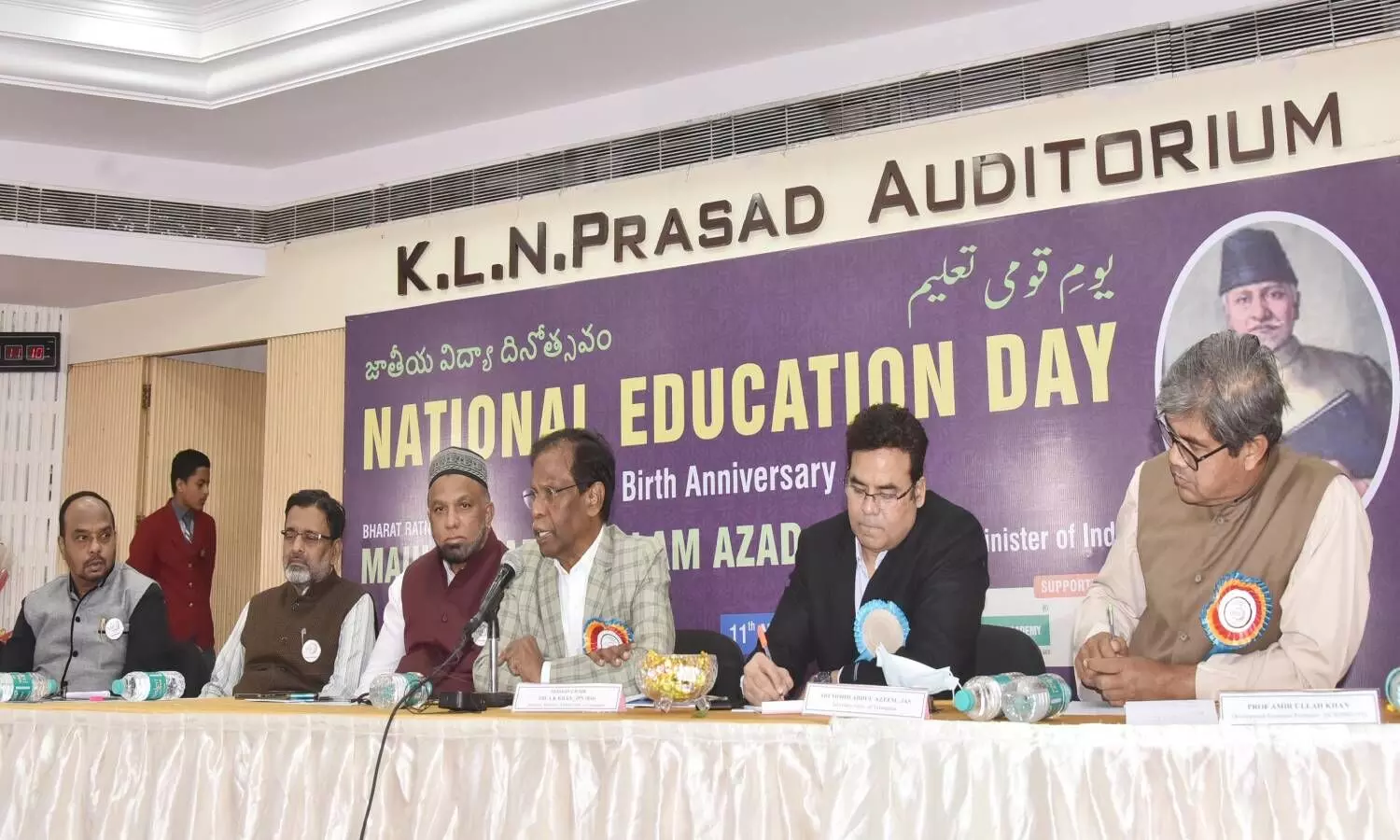National Education Day: Tributes paid to Maulana Azad on his birth anniversary
A threadbare discussion on various aspects of education took place here on Thursday to commemorate the 133rd birth anniversary of Maulana Abul Kalam Azad.
By J.S. Ifthekhar
Hyderabad: A threadbare discussion on various aspects of education took place here on Thursday to commemorate the 133rd birth anniversary of Maulana Abul Kalam Azad. Experts threw light on his invaluable contributions which led to a network of educational institutions spreading in the country. Pandit Nehru did not find anyone more competent than Maulana Azad to become the first education minister of independent India, speakers said paying tributes to the great visionary.
Teachers, students and educationists gathered in large numbers at the 'National Education Day' programme organized by the Association of Minority Educational Institutions (AMEI), an umbrella body of different organizations working for the cause of education. Maulana Azad called for democratization, secularization and universalization of education as he believed national building was possible only through education. Adhering to these ideals was of paramount importance, it was said. Education minister P. Saita Indra Reddy and Home minister Syed Mehmood Ali, who were supposed to attend the programme, did not turn up.
An animated discussion on re-enrolment of school dropouts and out-of-school children and the role of budget schools was held to examine the post-pandemic situation. Giving a PowerPoint presentation, Mohd Abdul Azeem, secretary to the government, referred to the educational emergency being talked about these days. It required Standard Operating Procedures (SOPs) to ensure a safe and secure environment for the reopening of schools. According to the UN report 2020, nearly 1.7 lakh learners across 190 countries were affected by the pandemic. What it meant was 94% of the world student population was impacted by COVID-19.
He called for frontline educational catalysts on the lines of COVID frontline warriors. Institutions like Anganwadi, PHCs, Rythu Vedias and Resident Welfare Associations should be utilized for this purpose. "Building trust through the engagement of local community and allaying fears of parents is the key factor to bring back children to schools," Mr. Azeem said.
Recounting his experience as a collector of Khammam and Bhoopalpally districts, he said it was important to fix learning losses through accelerated learning interventions. For this, paced learning, programmed learning, explorative and joyful learning were important. Economically disadvantaged groups, vulnerable groups, including girls, and groups with migratory issues in post-pandemic scenarios need to be targeted.
Most of the states, Mr. Azeem said, were financially overburdened on account of welfare schemes. Therefore it was necessary to create additional educational resources and infrastructure for the recall programme. States should ensure the uninterrupted flow of CSR funds through companies and other such stakeholders. As long-term measures, collectors should initiate build-back interventions by involving administrative and political machinery.
Dr. Sajid Ali, secretary, AMEI, spoke about the challenges being faced by budget schools. These schools were highly heterogeneous in nature but the rules of accreditation were uniform. Private schools, particularly budget schools, need as much attention as government schools without any discrimination. In India, 50 percent of students get educated through 4.5 lakh privately-managed schools. A majority of parents (73 percent) prefer private schools as they want better learning for their children.
Development economist Amirullah Khan praised the role of private schools and said the quality of education provided by them was 70 percent better than the public schools. A study done in UP showed that the budget schools provided education for as low as Rs. 36 per month. And it was nothing short of a miracle. Giving data about intergenerational mobility, he said SCs and STs had gained a lot educationally while the position of upper caste remained unchanged during 1950-1999. But the one community whose educational graph fell steeply was Muslims.
A.K. Khan, advisor to the government on Minority Affairs, said the private sector should not be seen as a competitor. Like the health sector, private schools played a complementary role. Paying encomiums, he said as the first education minister, Maulana Azad had left his deep imprints. Though he received his early education in Arabic and Persian at home, he had a high intellect. He spoke about Hindu-Muslim unity when he was just 24 years and did not like freedom coming at the cost of this unity.
Referring to the pandemic's impact on schools, Mr. Khan said all the 204 schools under the Telangana Minorities Residential Educational Institutions Society were open now. Utmost care was being taken to provide a COVID-free environment to the students. He explained how the TMREIS staff had gone the extra mile to ensure that students didn't drop out during the prolonged COVID-19 lockdown. In fact, 187 girl students had written to him asking for immediate reopening of the schools as they feared their parents might marry them off.
Earlier, Anwar Ahmed, president of AMEI, welcomed the gathering.